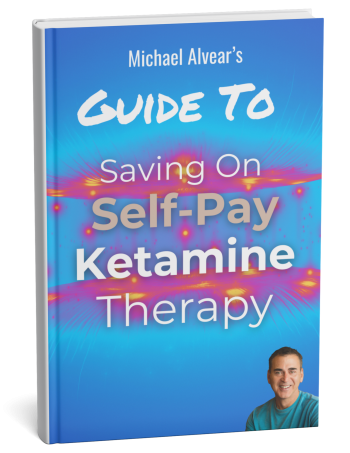9 Ways to Make Ketamine Treatment More Affordable
By Michael Alvear, Health Author & Independent Researcher
My research is published on these scholarly platforms:
Last Updated:
This article focuses on ketamine administration methods that are not typically covered by insurance–IV infusions and injections. Currently, Spravato is the only ketamine treatment eligible for insurance coverage.
Since insurance won’t cover IV infusions or injections you’re going to have to pay 100% out of pocket. At around $6,000 for a full course of infusions, that’s an expensive proposition.
Still, ketamine clinic providers are compassionate people who genuinely want to help. They understand the weight of depression and how difficult it can be to seek treatment, let alone worry about how to afford it. Most are more willing to work with you than you might think, and starting a conversation about costs doesn’t have to feel overwhelming.
There’s no question that negotiating a medical procedure can feel awkward, especially when you’re battling depression. It’s hard to advocate for yourself when your energy is low, your thoughts are clouded, and the idea of putting on a brave face feels impossible. But here’s the good news: you don’t need to be at your best to navigate this. You don’t have to march in like a tough negotiator or expend energy you don’t have.
With the right approach—calm, clear, and without pressure—you can explore options to make treatment more affordable. This guide will show you how to have these conversations with confidence, even when you feel like you have none to spare. Let’s work together to make getting the help you need a little easier. If you want a vastly more detailed account check out my guide, how to save money on self-pay ketamine:
Step 1: Ask About Sliding Scale Fees or Income-Based Pricing
Many ketamine clinics offer sliding scale fees or financial hardship programs to make treatment more affordable. Here’s how to approach it:
Start the Conversation
Call or email the clinic and ask directly:
“Do you have a sliding scale or income-based pricing for patients who are self-pay?”
Explain Your Situation: Share a brief overview of your financial challenges. You don’t need to go into detail—just enough to show that paying full price would be difficult for you.
Be Ready to Provide Documentation: Clinics may ask for proof of income, such as recent pay stubs, tax returns, or unemployment documentation. Having these on hand can speed up the process.
Follow Up If Necessary: If you don’t get an answer right away, send a polite follow-up email or call again. Persistence can pay off without needing to push too hard.
Why This Works
Sliding scale fees are common because clinics understand the financial strain of treatment. They want to help patients access care and are often willing to adjust costs to fit your circumstances. A simple, respectful inquiry is all it takes to start the process.
Most ketamine clinics are compassionate and experienced in handling these requests. Asking for a sliding scale isn’t just practical—it’s an expected part of making treatment accessible. Don’t hesitate to advocate for yourself; the support you need is closer than you think.
Step 2: Ask If They Have Payment Plans
For many patients, spreading the cost of ketamine therapy over time can make treatment far more manageable. Here’s how to approach it:
Ask About Payment Options: Contact the clinic and inquire:
“Do you offer payment plans or financing options for self-pay patients?”
Understand the Details: If a payment plan is available, ask about the terms:
- Monthly Payments: How much will they be, and for how long?
- Interest Rates: Are there additional fees, or is the plan interest-free?
- Down Payment Requirements: Will you need to pay part of the cost upfront?
Check for Financing Partners: Some clinics partner with medical financing companies, such as CareCredit. If so, ask about how to apply and what approval criteria you need to meet.
Negotiate Terms if Possible: If the terms don’t quite work for you, ask if there’s flexibility. Many clinics will be willing to adjust timelines or lower payments to fit your budget.
Why This Works
Payment plans exist to help patients access care without the burden of paying in full upfront. Clinics understand that financial constraints shouldn’t block treatment and often have systems in place to spread costs over time. By asking, you can make treatment more affordable without overwhelming your budget.
Step 3: Ask About Discounts for Multiple Sessions
Many clinics offer reduced rates if you purchase a package of sessions upfront. Here’s how to explore this option:
Start with a Simple Question
Ask the clinic directly:
“Do you offer discounts if I book multiple sessions at once?”
Understand the Savings
Inquire about the specifics:
Per-Session Cost: How much is each session in the package compared to paying individually?
Payment Timing: Does the entire amount need to be paid upfront, or can it be split into installments?
Refund Policy: Ask what happens if you don’t complete the full course—are unused sessions refundable?
Compare Packages
Some clinics offer several package sizes, such as 4, 6, or 8 sessions. Ask which option provides the best value.
Plan Your Budget
If upfront payment feels overwhelming, ask if a package can be combined with a payment plan to make it more affordable.
Why This Works
Buying sessions in bulk often benefits both you and the clinic. You get a lower per-session rate, and they secure a longer-term commitment. This is one of the most common ways clinics help patients manage costs.
Don’t hesitate to ask about package deals—they’re a win-win. Clinics want you to complete your treatment plan and are often happy to offer discounts for multiple sessions. With a quick conversation, you might save significantly while staying on track for recovery.
Step 4: Ask About Alternative Treatment Methods
Switching to a different form of ketamine therapy, such as intramuscular (IM) injections, oral tablets, or lozenges, can reduce costs while still delivering effective results. Here’s how to explore this option:
Ask About Alternatives: Start the conversation with your clinic:
“Are there more affordable options like IM injections or oral treatments available?”
Compare Costs: Ask for a breakdown of costs for each format. For example:
-
- IV Therapy: Typically the most expensive but offers precise dosing.
- IM Injections: Lower cost and widely available at many clinics.
- Oral/Lozenge Treatments: Often the most affordable option, though efficacy may vary by patient.
Discuss Effectiveness: Ask how the alternative formats compare in terms of treatment outcomes for your specific condition.
Consider a Combination Approach: Some clinics allow patients to start with IV therapy and transition to lower-cost formats like lozenges or tablets for maintenance.
Why This Works
Alternative formats provide the same active ingredient (ketamine) but at a lower cost due to differences in administration and equipment requirements. Clinics are familiar with these options and can guide you toward a choice that balances cost and effectiveness.
You don’t have to stick to one format to benefit from ketamine therapy. Exploring more affordable options is a practical way to lower costs without sacrificing results. Clinics are there to help you find the best fit for your needs and budget—just ask.
Step 5: Ask About Seasonal Promotions or Off-Peak Discounts
Some clinics lower their prices during slower periods or for appointments during less busy times. Here’s how to find out:
Start with a Question
Contact the clinic and ask:
“Do you offer any seasonal promotions or discounts for scheduling during off-peak hours?”
- Look for Patterns: Clinics often run promotions during holidays or slower months. Ask about historical discounts or upcoming deals to plan ahead.
- Inquire About Flexible Scheduling: If you have flexibility, ask which times or days are less busy. Booking midweek or during off-hours may come with reduced rates.
- Sign Up for Updates: Join the clinic’s mailing list or follow them on social media to stay informed about discounts or special offers.
Why This Works
Many clinics offer discounts during low-demand times to encourage bookings. By taking advantage of these promotions, you can save on treatment costs without compromising on care.
Seasonal and off-peak discounts are often easy to find with a quick question or a bit of flexibility in scheduling. Clinics want to fill their schedules and are happy to pass savings on to you. A simple inquiry could uncover the perfect opportunity to reduce your costs.
Step 6: Ask About Special Discounts
Many clinics offer reduced rates for specific groups, such as veterans, healthcare workers, first responders, or teachers. Here’s how to find out if you qualify:
Ask About Group Discounts
Reach out to the clinic and ask:
“Do you offer any special discounts for veterans, healthcare workers, or other groups?”
- Provide Verification If Needed: Clinics may ask for proof of eligibility, such as a military ID, badge, or employment verification. Having these ready can speed up the process.
- Check for Expanded Criteria: Some clinics extend discounts to other groups, like students, teachers, or nonprofit workers. Don’t hesitate to ask if your situation might qualify.
- Combine Discounts: If the clinic offers other discounts (e.g., package deals), ask if they can be stacked with a special rate for even greater savings.
Why This Works
Special discounts are a way for clinics to show appreciation for those in service-oriented roles or facing unique challenges. These discounts are often significant and readily available—you just need to ask.
Clinics are happy to provide special discounts as a way to support the community. A quick question could uncover savings you didn’t know were available, making your treatment more accessible.
Step 7: Compare Prices at Other Clinics
Pricing for ketamine therapy can vary widely between clinics, so exploring multiple options may help you find more affordable care. Here’s how to approach it:
Research Local Clinics
Look into other clinics in your area and note their pricing for the same type of treatment. Many clinics have pricing information on their websites, or you can call and ask.
Share What You Find
When speaking with a clinic, mention that you’re exploring other options:
“I’ve noticed some clinics in the area offer treatments at a lower price. Are there any discounts or alternatives you might suggest?”
- Weigh Other Factors: While price is important, also consider the clinic’s reputation, experience, and the quality of care they provide. Balance affordability with trust and safety.
- Ask About Adjustments: Even if a clinic can’t match a lower price, they may be able to offer other solutions, such as discounts for multiple sessions or alternative treatment formats.
Why This Works
Clinics understand that patients are looking for value, and they want to remain competitive. While they may not always lower prices, they might offer alternative ways to make care more affordable.
Taking the time to compare prices can reveal surprising options. Clinics respect informed patients and may be more willing to work with you if they know you’re thoughtfully considering your choices. A little research could lead to big savings.
Step 8: Ask About Clinical Trials or Research Studies
Participating in clinical trials or research studies is an excellent way to access free or discounted ketamine treatments. Here’s how to explore this option:
Search for Local Studies:
Check websites like ClinicalTrials.gov or research centers in your area for ongoing ketamine-related studies.
Ask the Clinic Directly: Contact your clinic and ask:
“Are you aware of any clinical trials or research studies that offer ketamine therapy at reduced costs?”
Understand the Requirements
Clinical trials often have specific criteria for participation, such as certain medical conditions or age ranges. Be prepared to answer questions about your health history.
Check for Ethical Oversight
Ensure the trial is supervised by qualified professionals and has proper ethical approval, such as Institutional Review Board (IRB) oversight.
Plan for Follow-Ups
Trials may involve more frequent check-ins or questionnaires than standard treatment. Confirm that these additional steps fit your schedule.
Why This Works
Research studies provide free or discounted access because they rely on participants to test treatments under controlled conditions. This can be a win-win, offering you treatment while advancing scientific understanding.
Clinical trials aren’t just for rare cases—they’re often accessible to everyday patients and can be a valuable way to afford treatment. A quick search or conversation could open the door to care at little or no cost. It’s worth exploring.
Step 9: Ask About Financial Assistance Programs or Scholarships
Some clinics or nonprofits offer financial aid or scholarships to help cover the cost of ketamine therapy. Here’s how to find out if you qualify:
Start with the Clinic
Ask directly:
“Do you have any financial assistance programs or partnerships with organizations that can help with costs?”
Research Nonprofit Support: Look into mental health nonprofits or foundations that focus on treatment accessibility. Some may provide grants or connect you with clinics offering reduced rates.
Look for Local Programs: Clinics in your area may have unique partnerships or community-based programs to assist patients with financial needs.
Understand the Application Process: Assistance programs may require an application or proof of financial need. Be prepared to provide documents like tax returns or income statements if asked.
Stay Persistent: Availability of aid can vary, but new programs may emerge over time. If no options are available now, check back periodically.
Why This Works
Financial assistance programs exist to bridge the gap for patients who otherwise couldn’t afford treatment. While availability may be limited, many clinics and nonprofits are deeply invested in helping patients access care
Asking about financial aid might feel daunting, but these programs are designed for patients like you. Clinics and nonprofits want to help you get the treatment you need. A single question could lead to the support you’ve been looking for.



